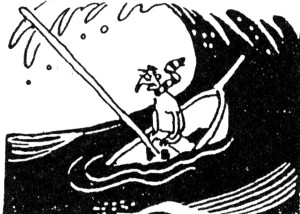ประโยค going to: คุณกำลังดูกระทู้
นอกจากรูปแสดงอนาคตกาลโดยใช้ will หรือ shall ใน future simple แล้ว ยังมีรูป future simple โดยใช้ be going to ด้วยเช่นกัน รูปดังกล่าวนี้มีการใช้บ่อยๆ ในสถานการณ์หรือเหตุการณ่ในอนาคต ฉะนั้นผู้เขียนจะขอกล่าวถึงเรื่องนี้ โดยละเอียดตามลำดับดังนี้
รูปของ be going to
(1) Statement form (สเตทเม้นทฺ ฟอม) หรือในภาษาไทยเรียกว่า “รูปบอกเล่า” ประกอบด้วย
ภาคประธาน + is/am/are + going to + กริยาแท้ช่อง 1 + ภาคกรรมหรือส่วนขยาย
อธิบาย
going to เป็นส่วนที่แสดงเหตุการณ์หรือการกระทำในอนาคต กริยาแท้ช่อง 1 หมายความเช่นเดียวกับ infinitive without to หรือกริยาแท้ช่อง 1 ที่ไม่มี to
ตัวอย่าง
Look at the clouds. It is going to rain soon.
ดูเมฆสิ ฝนจะตกในไม่ช้า
Look out! That boy is going to fall down.
ระวัง เด็กชายคนนั้นจะตกลงมาแล้ว
(2) Negative form (เนเกอทิฟวฺ ฟอม) หรือในภาษาไทยเรียกว่า “รูป ปฏิเสธ” ประกอบด้วย
ภาคประธาน + is/am/are not + going to + กริยาแท้ช่อง 1 + ภาคกรรมหรือส่วนขยาย
อธิบาย รูปย่อของ is not = isn’t หรือ ’s not
am not = ’m not
are not = aren’t หรือ ’re not
ตัวอย่าง
The machine is quite old. I’m afraid it’s not going to work. เครื่องจักรค่อนข้างเก่า ผมเกรงว่ามันจะไม่ทำงาน
If we hurry, I’m sure we’re not going to miss the train.
ถ้าเรารีบ ผมแน่ใจว่าเราจะไม่พลาดรถไฟ
(3) Yes-No question (เยส โน เควสเชิ่น) หรือในภาษาไทยคือ “คำถาม ที่ผู้ตอบจะตอบว่า Yes/No” ประกอบด้วย
Is/Am/Are + ภาคประธาน + going to + กริยาแท้ช่อง 1 + ภาคกรรม
หรือส่วนขยาย
ตัวอย่าง
A : Is it going to rain?
B : Yes, if there is no wind.
ก – ฝนจะตกหรือ
ข – ใช่ ถ้าไม่มีลม
A : Are we going to tell him when he asks us?
B : No. We won’t let him know.
ก – เราจะบอกเขาไหมหากเขาถามเรา
ข – ไม่เราจะไม่ให้เขารู้
(4) Wh-word question (ดับเบิลยู เอช เวิด เควสเชิ่น) หรือในภาษา ไทยคือ “คำถามที่ขึ้นต้นประโยคด้วย Wh-words ได้แก่ What, When, Where, Why, How long, … ฯลฯ’’ ประกอบด้วย
Wh-word + is/am/are + ภาคประธาน + going to + กริยาแท้ช่อง 1 + ภาคกรรมหรือส่วนขยาย
แต่ถ้าหากใช้คำถาม Who โครงสร้างที่ใช้จะประกอบด้วย
Who + is/am/are + going to + กริยาแท้ช่อง 1 + ภาคกรรมหรือส่วนขยาย
เมื่อคำตอบอยู่ในภาคประธานของประโยค
Who + is/am/are + ภาคประธาน + going to + กริยาแท้ช่อง 1 +
ภาคกรรมหรือส่วนขยาย
เมื่อคำตอบอยู่ในภาคกรรมของประโยค
Who + is/am/are + going to + กริยาแท้ช่อง 1 + ภาคกรรมหรือส่วนขยาย
เมื่อคำตอบอยู่ในภาคประธานของประโยค
ตัวอย่าง
A : When are you going to return my book?
B : Tomorrow.
ก – เมื่อไรคุณจะคืนหนังสือของดิฉัน
ข – พรุ่งนี้
A : Where are we going to stay tonight?
B : In a temple, perhaps.
ก – คืนนี้เราจะพักกันที่ไหน
ข – บางทีอาจจะพักที่วัด
John is going to tell Mary the truth.
A : Who is going to tell Mary the truth?
B : John.
ก – ใครจะเล่าความจริงให้แมรี่ฟัง
ข – จอห์น
We are going to give Susan a ring.
A : Who are we going to give a ring?
B : Susan.
ก – เราจะให้แหวนแก่ใคร
ข – ซูซาน
การใช้ be going to
1. ใช้ be going to เพื่อกล่าวถึงเหตุการณ์หรือสถานการณ์บางอย่างใน อนาคตที่มีเหตุบ่งบอกให้เห็นชัดเจนในขณะปัจจุบัน ลักษณะดังกล่าวนี้แสดงให้เห็นถึงความรู้สึกมั่นใจของผู้พูดเกี่ยวกับเหตุการณ์หรือสถานการณ์ที่จะเกิดขึ้นตามมา จากสาเหตุปัจจุบัน ในอนาคตอันใกล้
ตัวอย่าง
Look at those black clouds in the sky. It’s going to rain. Those people are going to get wet.
ดูเมฆดำทะมึนในท้องฟ้าเหล่านั้นสิ ฝนกำลังจะตก คนเหล่านั้นกำลังจะเปียก
แต่ ถ้าใช้ will จะหมายถึง เราคิดหรือเชื่อว่าจะเกิดเหตุการณ์นั้นในอนาคต ซึ่งภาวะของการเกิดเหตุการณ์ยังห่างไกลกว่าการใช้ be going to
ตัวอย่าง
That boat doesn’t look very safe.
It’ll sink in that heavy sea.
เรือลำนั้นดูไม่ค่อยปลอดภัย
มันอาจจะจมในทะเลที่คลื่นลมแรง
Look at that boat! It’s going to sink.
มองดูเรือลำนั้นสิ มันกำลังจะจม

อธิบายในภาพที่ 1 ชายคนนี้ยังไม่ได้เอาเรือลงทะเล เขาอาจจะเปลี่ยนใจไม่เอาเรือลงทะเลก็ได้ เพราะแลเห็นคลื่นลมที่แรงจัด ภาวะของการเกิดอันตรายต่อเรือและชายคนนี้ยังอยู่ไกลตัว

แต่ในภาพที่ 2 เรือและชายคนนี้กำลังเผชิญกับคลื่นลมแรงในทะเลที่บ้าคลั่ง ภาวะของการเกิดอันตรายอยู่ใกล้ตัว โอกาสของการนำเรือเข้าฝั่งเพื่อให้ชีวิตรอด แทบไม่มีเลย
Don’t climb up that tree.
You’ll fall and hurt yourself.
อย่าปีนขึ้นต้นไม้ต้นนั้น
ลูกอาจจะตกลงมาได้รับบาดเจ็บ
Look out! You’re going to fall!
ระวัง ลูกกำลังจะตกลงมา

อธิบาย ในภาพที่ 1 แม่บอกลูกที่กำลังทำท่าจะปีนขึ้นต้นไม้ แต่ยังไม่ได้ ปีนขึ้น เพื่อจะเอาลูกบอลที่ค้างอยู่ลงมา แม่ทำนายในสิ่งที่อาจจะเกิดขึ้นแต่ยังอยู่ไกลตัวเพราะลูกยังไม่ได้ปีน

แต่ในภาพที่ 2 ลูกปีนขึ้นไปแล้ว และกำลังเกาะอยู่บนกิ่งไม้ที่กำลังหัก แม่ร้องเตือน (warning วอนิ่ง) ลูกเพราะภาวะของการเกิดอันตรายอยู่ใกล้ตัว เลี่ยงที่จะไม่ให้เกิดเหตุการณ์นั้นได้ยากแล้ว
จะเห็นได้ว่าทั้งสองภาพเป็นการทำนาย (prediction) เหมือนกัน แต่ ต่างกันตรงที่ความมากน้อยของโอกาสที่จะเกิดเหตุการณ์นั้น
2. ใช้ be going to เพื่อกล่าวถึงสิ่งที่เราตั้งใจและตัดสินใจไว้แล้วล่วงหน้า ว่าจะทำ แสดงถึงการกระทำที่ได้มีการวางแผนไว้แล้วว่าจะทำในอนาคตอันใกล้หรือกล่าวอีกนัยหนึ่งคือเป็นการวางแผนไว้ก่อนแล้ว (prior plan ไพรเออะ แพลน) นั่นเอง
ตัวอย่าง
I’m going to have a shower.
ผมกำลังจะอาบน้ำ (ชายคนนี้กำลังเปิดประตูเข้ามา มีผ้าเช็ดตัวพร้อมที่จะอาบน้ำ)
แต่ ถ้าใช้ will จะหมายถึง การตัดสินใจว่าจะทำสิ่งหนึ่งๆ ในขณะที่พูด เป็นการตัดสินใจที่เกิดขึ้นฉับพลันโดยไม่ได้มีการเตรียมการมาก่อนล่วงหน้า
ตัวอย่าง
A : I’m sorry. I’ve spilt some wine on my jacket.
B : Don’t worry. I’ll clean it for you.
ก – ผมขอโทษ ผมทำไวน์หกรดเสื้อแจ็กเก็ตของคุณ
ข – ไม่ต้องกังวล ดิฉันจะซักให้
อธิบาย คำพูดของภรรยา (B) เป็นการเอ่ยขึ้นทันที หลังจากที่สามี (A) บอกว่าทำไวน์หกรดเสื้อแจ็กเก็ต จึงเห็นได้ว่าภรรยาตัดสินใจทันทีเมื่อสามีพูดจบ โดยที่ภรรยาไม่ได้เตรียมการที่จะพูดมาล่วงหน้าแต่อย่างใด เป็นการเอ่ยว่าจะซักเสื้อให้เมื่อสามีบอกถึงสิ่งที่เกิดขึ้น
A : Why have you moved all the furniture out of this room?
B : I’m going to clean the carpet.
ก – ทำไมคุณจึงเคลื่อนย้ายเครื่องเรือนทุกชิ้นออกจากห้องนี้
ข – ดิฉันจะทำความสะอาดพรมค่ะ
อธิบาย คำพูดของ A ที่ถามว่า “ทำไมคุณจึงเคลื่อนย้ายเครื่องเรือนทุกชิ้นออกจากห้องนี้’’ แสดงให้เห็นชัดว่า A แลเห็นเครื่องเรือนวางอยู่นอกห้องนั้นมากมาย จึงเกิดความสงสัยและซักถามถึงเหตุผล ซึ่ง B ได้ตอบให้ทราบถึงความตั้งใจว่า “ดิฉัน จะทำความสะอาดพรม’’ คำตอบของ B แสดงถึงการเตรียมการว่าจะทำความสะอาดพรมมาล่วงหน้า จึงได้ทำการเคลื่อนย้ายเครื่องเรือนเหล่านั้นออกมาจากห้อง
3. ในการแสดงความเต็มใจ (willingness วิลลิงเนส) ว่าจะทำสิ่งหนึ่งๆ ให้ จะใช้ will เท่านั้น ไม่ใช้ be going to
ตัวอย่าง
A : The phone’s ringing.
B : I’ll get it.
ก – โทรศัพท์กำลังดัง
ข – ผมจะช่วยรับสายให้
A : I don’t understand this math problem.
B : Ask your teacher about it. She’ll help you.
ก – ผมไม่เข้าใจปัญหาคณิตศาสตร์ข้อนี้
ข – ถามคุณครูของคุณสิ เธอจะช่วยคุณได้
ที่มา:รองศาสตราจารย์ทณุ เตียวรัตนกุล
(Visited 58,285 times, 1 visits today)
Table of Contents
[Update] *going to* แปลว่าอะไร ดูความหมาย ตัวอย่างประโยค หมายความว่า พจนานุกรม Longdo Dictionary แปลภาษา คำศัพท์ | ประโยค going to – NATAVIGUIDES
going toAm I going to have a false tooth or a crown?
going toAnd you are going to raise it in three days?
going toA new teacher’s going to take charge of this class.
going toAnyway, whatever I say, you are going to go.
going toApparently an old friend of mine is going to a university in Osaka in Spring.
going toAren’t you are going to get Mr Tate?
going toAre you going to anywhere this summer?
going toAre you going to attend ceremony?
going toAre you going to attend the meeting?
going toAre you going to attend the meeting tonight?
going toAre you going to buy that auto?
going toAre you going to buy the car?
going toAre you going to carry on your work until ten?
going toAre you going to cry till the cows come home?
going toAre you going to cut down all the trees here?
going toAre you going to do your homework this afternoon?
going toAre you going to go to Tokyo tomorrow?
going toAre you going to have dinner at home?
going toAre you going to invite her to the party?
going toAre you going to learn English?
going toAre you going to let this fried chicken go begging?
going toAre you going to pay a visit to China this fall?
going toAre you going to play tricks on me again, you naughty boy?
going toAre you going to pull curfew on me?
going toAre you going to quit your job?
going toAre you going to remove the nerve?
going toAre you going to school tomorrow?
going toAre you going to send this by parcel post?
going toAre you going to sing?
going toAre you going to sing here?
going toAre you going to stay long?
going toAre you going to stay there for long?
going toAre you going to take part in the contest?
going toAre you going to take part in the English speech contest?
going toAre you going to take part in the next race?
going toAre you going to take the entrance examination?
going toAre you going to the theater tonight?
going toAre you going to visit any other countries?
going toAre you going to write to your father?
going toAs a matter of fact, he’s going to the states.
going toA slight cold prevented me from going to Ibusuki with my family.
going toAs long as I’m going to be in London, I ought to see a play or two.
going toA sudden illness prevented me from going to the station to meet him.
going toAt last you are going to be a June bride.
going toAt the beginning of the fifth year, Tony said he was going to have to charge more.
going toBeautiful women die young – or so the saying goes. If so then my wife is going to live a long life.
going toBe more careful. Rushing through things is going to ruin your work.
going toBe sure to take this medicine before going to bed.
going toBetween you and me, I’m going to quit my present job soon.
ฝึกพูดประโยคภาษาอังกฤษ want to \u0026 would like to (ต้องการ, อยากจะ)
ฝึกพูดประโยคภาษาอังกฤษ want to \u0026 would like to (ต้องการ, อยากจะ)
https://www.facebook.com/PracticeEnglishWithThaiEnglishGirl/
นอกจากการดูบทความนี้แล้ว คุณยังสามารถดูข้อมูลที่เป็นประโยชน์อื่นๆ อีกมากมายที่เราให้ไว้ที่นี่: ดูความรู้เพิ่มเติมที่นี่

AVOID Repeating These 6 Everyday Words in Daily English Conversation – Use Advanced Alternatives
Want to avoid repeating the same words like please, sorry, tired, sad, bored and fine. I teach you advanced alternative vocab to use in conversation. Download the FREE PDF from today’s video: https://bit.ly/6AlternativesPDF
DO YOU WANT TO RECEIVE EMAILS FROM LUCY? Sign up here: https://bit.ly/EmailsFromLucy
Don’t forget to turn on subtitles if you need them! This is how I generate my subtitles (you can get a $10 subtitle coupon too): https://www.rev.com/blog/coupon/?ref=lucy (affiliate)
Visit my website for free PDFs and an interactive pronunciation tool! https://englishwithlucy.co.uk
MY SOCIAL MEDIA:
Personal Channel: http://bit.ly/LucyBella (I post subtitled vlogs of my life in the English countryside! Perfect for listening practice!)
Instagram: @Lucy http://bit.ly/lucyinsta
My British English Pronunciation Course is now LIVE: https://englishwithlucy.co.uk/pronunciationcourse (use code YOUTUBE10 for a 10% discount!)
Do you want to improve your pronunciation? I have launched my British English (Modern RP) pronunciation course! I’ll train you to read phonetic transcriptions, and produce each sound that comprises modern received pronunciation. I’ll also teach you how to implement the correct use of intonation, stress, rhythm, connected speech, and much more. We’ll compare similar sounds, and look at tricky topics like the glottal stop and the dark L.
Technically, I need to mark this as an AD even though it is my own company so AD 🙂
Want to get a copy of my English Vocabulary Planners? Click here: https://shop.englishwithlucy.co.uk The best offer is the 4book bundle where you get 4 planners for the price of 3. This product is very limited don’t miss out. The English Plan will be shipped from early August, from me here in England to you across the world! We ship internationally!
Watch my explainer video here: https://bit.ly/TheEnglishPlanVideo
Practice speaking: Earn $10 free italki credit: https://go.italki.com/englishwithlucy… (ad affiliate)
Improve listening! Free Audible audiobook: https://goo.gl/LshaPp
If you like my lessons, and would like to support me, you can buy me a coffee here: https://kofi.com/englishwithlucy
FREE £26 Airbnb credit: https://www.airbnb.co.uk/c/lcondesa (ad affiliate)
Email for business enquiries ONLY: [email protected]
Edit by Luigi [email protected]

100 ประโยคอังกฤษถามตอบ – เรียนภาษาอังกฤษ ออนไลน์ ฟรี – ฝึกพูดภาษาอังกฤษ – GetEng123
100 ประโยคภาษาอังกฤษง่ายๆ พื้นฐานใช้ประจำ และใช้ได้ในหลากหลายโอกาส เช่น การเดินทาง ท่องเที่ยว ร้านอาหาร….
ผู้เรียนท่านใดที่เจอปัญหาเรื่องการเรียนคำศัพท์ภาษาอังกฤษต้องไม่พลาดกับบทความนี้. ขอบคุณที่รับชม อย่าลืมติดตามด้วยนะ
ประโยคสั้นๆ ใช้ในชีวิตประจำวัน: https://youtu.be/b4zubHBwqWg
ฝึกพูดภาษาอังกฤษในชีวิต ประ จํา วัน: https://youtu.be/EFREcZ53Yvg
Wh Question คืออะไร: https://youtu.be/smVmnXhZeeA
100 คำตรงข้ามภาษาอังกฤษ: https://youtu.be/lQ3hS7pDFYA
100 คำกริยาภาษาอังกฤษที่ใช้บ่อยที่สุด: https://youtu.be/j2dkDtj0HNI
ศัพท์ ภาษา อังกฤษ: https://www.youtube.com/watch?v=KaWVjwC23FU\u0026list=PL4pCfDUMdhfv9_ItMlJMpN6SaMoIKInx\u0026index=1
geteng123 ภาษาอังกฤษ ถามตอบ คำศัพท์ learnenglish vocabulary
เรียนภาษาอังกฤษทุกวันด้วยความหลงใหล! สามารถกดแชร์ไว้บนเฟซบุ๊ก แล้วเข้ามาฟังบ่อยๆ ทุกวัน จะได้จำศัพท์พร้อมการออกเสียงที่ถูกต้องได้ด้วย

(Reading Practice (Improve your pronunciation in English
reading
https://www.youtube.com/playlist?list=PLB8Nx5XHhSwRZD2XcvAszBLNlq3prmItf

\”จะ\” ใช้ Will หรือ Going to | Tina Academy Ep.40
เทคนิควิธีการใช้คำว่า \”จะ\” จะใช้ Will หรือ Going to ดี?
♡ รายละเอียดคอร์สสอนภาษา https://www.tinaacademy.com
♡ Subscribe จะได้ไม่พลาดคลิปทุกๆสัปดาห์
https://www.youtube.com/tinathanchannel/
♡ Instagram: https://www.instagram.com/tinathanchannel
♡ Facebook: https://www.facebook.com/tinathanchannel
♡ Line ID: @hxr4999x https://line.me/R/ti/p/%40hxr4999x

นอกจากการดูบทความนี้แล้ว คุณยังสามารถดูข้อมูลที่เป็นประโยชน์อื่นๆ อีกมากมายที่เราให้ไว้ที่นี่: ดูบทความเพิ่มเติมในหมวดหมู่MAKE MONEY ONLINE
ขอบคุณมากสำหรับการดูหัวข้อโพสต์ ประโยค going to